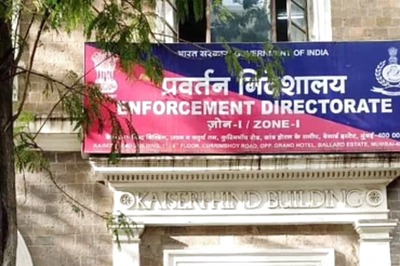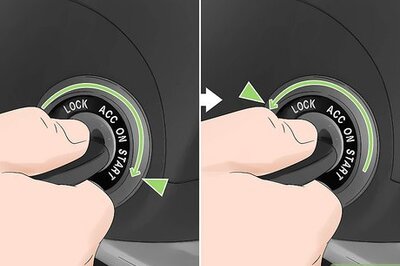
views
While the country is still attempting to cope with the multifarious effects of the Covid-19 lockdown, certain sections such as the underprivileged and migrant workers have been hit the hardest. In a conversation with News18, renowned economist, social scientist and activist Jean Drèze points out that the lockdown is "almost a death sentence" for India's poorest and cites bolstering of MNREGA and PDS among emergency measures needed to provide immediate relief to disadvantaged citizens.
In your estimate, what is the impact of the lockdown on the lives and livelihood of those in the informal sector? How many people, do you think, are affected?
Virtually everyone in the informal sector is affected, and that means the bulk of the population. Of course, even in the informal sector, some people must be having a good time, as always happens in crisis situations. If you are, say, a freelance designer with a nice home, and you can work from there in between some reading and net surfing, with the added thrill of watching the crisis unfold on TV, the lockdown is not very different from a holiday. But for most people, the lockdown is an economic disaster, the more so the poorer you are. For those who were living from hand to mouth to start with, the lockdown is almost a death sentence. That is the message of the long list of “lockdown deaths” compiled by Kanika Sharma and others.
What do you see as the main flaws of the current lockdown and relief policies? What sort of changes are needed?
It would be nice to see a better sharing of the hardships and risks of the crisis. Today, the poor are bearing most of the burden of India’s lockdown, one of the harshest in the world. The policies are made or influenced by a class of people who pay little attention to the consequences for the underprivileged. Just think, for instance, of how all sorts of basic services have been shut down without batting an eyelid: outpatient health services, child immunisation, school meals, MNREGA worksites, the lot.
For good measure, the policies are often enforced in an authoritarian manner. Ideally, people should be empowered to face this crisis together, instead of being treated like sheep. Here in Jharkhand, I have been struck by so many people’s readiness to help in one way or another. But this good will is not being tapped. This mirrors India’s long-standing failure to foster and mobilise human resources for development. Kerala is one exception, and sure enough, it is handling this crisis in an inspiring manner.
Not everyone who is vulnerable has been included as a beneficiary under the National Food Security Act. Some states are reaching out to such people. What can be done to minimise the distress?
The NFSA is supposed to cover all poor people and some more, but identifying the poor is always a difficult exercise, so naturally, some get left out. Others are included but lose their ration card later for some reason, like failure to link it with Aadhaar. And then, in many states, there is a major problem of young couples being excluded because the household was formed after ration cards were distributed, and the state government refuses to issue more ration cards. For these and other reasons, a substantial proportion of poor people are excluded from the public distribution system in most states.
The situation now is that, having lost their jobs, they are at risk of hunger and need urgent food assistance. Further, there is no time or machinery to conduct a fresh survey to identify the poor, and in any case the usual eligibility criteria would not work well in this situation. There lies the argument for universalisation of the PDS, at least in rural areas and urban slums, for the duration of the crisis.
What, in your opinion, should the central and state governments do immediately to fend off hunger and starvation? Especially when after the lockdown is lifted, it will not be easy to find work.
If the PDS is universalised, at least on a temporary basis, the danger of hunger and starvation will be largely averted. That does not mean that people will be well-nourished, but at least they will not be skipping meals and that sort of thing. As a further safeguard against hunger, community kitchens can help. The schools are closed and they have kitchens; why not keep the midday meal scheme going and allow anyone at risk of hunger to have a meal there? Even when the schools reopen, this can be done. This is not the only possible approach, but some emergency facility of this sort is likely to be needed in the next few months.
There are migrants who have been locked out in various parts of the country. There is tremendous anxiety among them to return home. What would you recommend?
Migrant workers have attracted a lot of media attention, but we should also think of their families. Many of them consist of young women and children who depend on remittances from the migrants, mainly young men. As I said, many of these young couples don’t have a ration card. So, the women are now doubly vulnerable: they get no food rations from the PDS and no cash from the migrant workers. Imagine how they must feel, with resources running out and no idea of how long it will take for the migrants to return. And naturally, the migrants worry about their families too, that is one reason why so many of them are anxious to go home.
I mention this because it helps to understands how harsh it is to prevent them from returning. We are told that this must be done to contain the spread of the virus, but I doubt that this is the main reason. From a health point of view, it may be better to help migrant workers to return in a staggered and organised fashion than to keep them captive in overcrowded conditions and then open the floodgates later. I suspect that the real reason for resistance to the migrants’ return is that employers in the host states don’t want to lose this pool of cheap labour. But then, the longer they are held back and the worse they are treated, the higher the chances that they will prefer to stay home for a while after the lockdown.
On the Mahatma Gandhi National Rural Employment Guarantee Act - there are pending dues of workers, some states like Odisha have pitched for lifting the ban on MNREGA work. What would you recommend? Should the ban be lifted and MNREGA work be scaled up?
I think that MNREGA has a critical role to play in this situation. I have argued for extensive food assistance ever since the lockdown began, but people cannot live just on food, let alone rice or wheat. They need cash for all sorts of essential things, even when they are confined to their homes. For instance, people are being told that they must keep washing their hands with soap, but what if there is no money for soap?
At the moment, the best hope most people have of cash relief is a monthly transfer of five hundred rupees for three months, if an adult woman in the household has a Jan Dhan Yojana account. By contrast, if two adult members get MNREGA work for a month, they can earn at least ten thousand rupees. Obviously, regular MNREGA work with timely payment can help people much more than any of the relief measures so far. So, coming to your question, yes, I feel that MNREGA needs to be scaled up, massively and urgently. State governments should open worksites pro-actively in every village. They have little reason to hesitate since the central government is paying the wages.
Some health safeguards will be required, but ensuring that MNREGA workers maintain some distance and wash their hands from time to time is not exactly rocket science. In fact, MNREGA is a good opportunity to impart these habits in places where health messages are still a bit of an abstraction. The real problem, I feel, is that MNREGA has become so complex and cumbersome that it may not work well as a fast-track relief measure. I would argue for a swift transition to what might be called “MNREGA basic” for the purpose of emergency relief.
Can you give some examples of what this approach would involve?
One useful simplification would be to go for fixed daily wages instead of piece-rate payments. Both are allowed under the Act, and daily wages dispense with the hassles of work measurement. They also make it possible to take up a wider range of works.
Further, I feel that in this situation it would be good to return to the old principle of allowing workers to turn up at the worksite without a prior work application. The online application process, known as “e-muster rolls”, is a major source of exclusion aside from giving middlemen an opening into the programme.
If possible, states should also be allowed to return to cash payment at the end of the week instead of online bank payments. There is much to be said for bank payments in normal circumstances, but reliable bank payment within fifteen days is still an elusive goal. You cannot ask people who have no reserves to work without a guarantee of timely payment.
Of course, both on-the-spot employment at the worksite and cash payment may reopen some of the old corruption channels. But I think that we are now in a better position to deal with these earlier vulnerabilities. For instance, with the spread of literacy, most states would now be able to adopt the Tamil Nadu system where all workers sign the muster roll every day. Similarly, smartphones can be used with good effect for sustained monitoring of MNREGA worksites. Some of these safeguards could be more effective, in my view, than the current fixation with online transactions.
All this, of course, needs considerable thought and discussion, but the sooner the better. My sense is that the demand for MNREGA work has never been so strong, certainly in Jharkhand. This is a great opportunity to repair some of the damage inflicted by this lopsided lockdown.




















Comments
0 comment